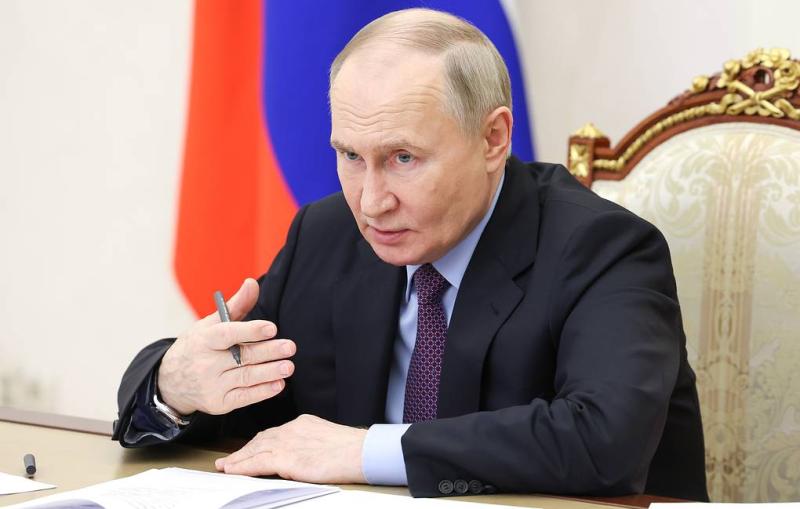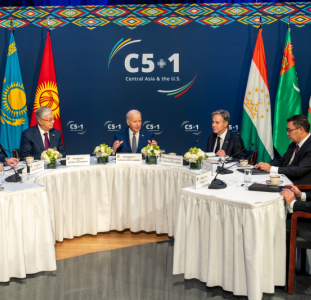
- Press review: US lets Kiev use anti-personnel mines and Iran may halt uranium enrichment
- Press review: Uranium costs soar as Moscow updates nuclear doctrine and US OKs attacks
- Press review: Russian air defenses can down Western missiles as EU conducts live exercise
- G20 leaders adopt Rio de Janeiro Summit Declaration
President Vladimir Putin upgrades Russia’s nuclear doctrine; China's ballistic missile test in the Pacific raises alarms in the US; and the EU balks at the idea of letting Ukraine conduct strikes deep inside Russia. These stories topped Thursday's newspaper headlines across Russia, according to TASS News Agency.
Izvestia: Putin sends signal to West as Russia reworks nuclear doctrine
Russia will view any attack on the country by a non-nuclear power supported by a nuclear state as a joint attack. And Moscow can move to use nukes upon receiving reliable information about a massive launch of aerial attack means, cruise missiles or drones and their crossing of the country’s state border, Russian President Vladimir Putin announced at a Security Council meeting on September 25. Putin also broadened the category of countries and military unions subject to nuclear deterrence. Besides, Russia reserves the right to use nuclear weapons in the event of aggression against Belarus. Experts interviewed by Izvestia say the updated doctrine is a necessary and convincing response, including to threats by NATO allies to give Ukraine the go-ahead to strike targets deep inside Russia.
These changes to the Russian nuclear doctrine have been in the works for months. Putin first announced steps to revise the document in June. However, the massive change to the nuclear doctrine does not necessarily mean immediate escalation. Rather, it serves as a signal from Russia to Western countries in response to threats to the country’s security. Among other things, the updated doctrine was announced amid the debate in the West about whether Ukraine should be allowed to use longer-range missiles against targets deep inside Russia.
Editor-in-Chief of the National Defense Journal Igor Korotchenko told Izvestia that Russia revisited its nuclear doctrine after the West failed to take a hint from a Russian exercise this summer involving non-strategic nuclear forces that practiced preparations for using tactical nuclear weapons in combat in the Southern, Central and Leningrad military districts, including by units from Russia’s Aerospace Forces and Navy.
"We can see that our Western opponents no longer recognize any `red lines’ as they believe that sending weapons to Ukraine or using Western military aid for strikes against targets deep inside Russia will not trigger nuclear escalation," the expert said. "The upcoming changes are Russia’s forced response, ensuring at least on a doctrinal level that we can immediately factor in nuclear options where they meet specific criteria," he added.
Putin’s recent warning that Russia will use appropriate weapons if longer-range missiles are used against the country gave the West pause, military expert Viktor Litovkin told Izvestia.
Kommersant: China tests ballistic missiles in Pacific
On Wednesday, the People’s Republic of China (PRC) conducted an intercontinental ballistic missile (IBM) test outside its territory, its first in more than four decades, as it informed the world about it on the same day. The news likely raised alarms in the United States, which insists that the building up of Beijing’s nuclear and missile potential goes beyond the bounds of any reliable deterrence minimum, forcing the Americans to respond. Meanwhile, Kremlin Spokesman Dmitry Peskov pointed out that China has every right to conduct such tests as it continues to try to boost its army.
China last tested an IBM in the southern Pacific in 1980. In the past few years, China has been enhancing its military capabilities in general and its nuclear forces in particular to achieve Chinese leader Xi Jinping’s goal of transforming the People’s Liberation Army (PLA) into a "world class" military by 2049.
Beijing has been boosting its nuclear forces in order to counter the United States and upgrade its own missile defenses. However, while China has formally committed to never using nuclear weapons first, the United States has not.
Academician Alexey Arbatov, head of the Center for International Security at the Russian Academy of Sciences’ Institute of World Economy and International Relations, told Kommersant that the fact that China has been upgrading its strategic nuclear deterrent is no secret to anyone, therefore the Americans have been considering a response since 2021. According to him, the Biden administration has already responded by moving to rearm Tomahawk cruise missiles with nuclear warheads. "The United States is currently debating how to reform its policy regarding strategic nuclear weapons so that it can contain two roughly equal adversaries, weighing whether they should have an arsenal the size of those possessed by Russia and China together or whether they should opt for a more rational response. In any case, some response will come," Arbatov concluded.
Izvestia: EU balks at idea of letting Ukraine carry out strikes deep inside Russia
While the European Parliament recently moved to adopt a resolution calling on EU countries to lift restrictions on Kiev’s attacks on targets inside Russia, the European Commission assured Izvestia that it will not do the same. "Ukraine has the inalienable right to strike military targets in Russia. Decisions on whether to use weapons provided by individual EU member states for this purpose should be made exclusively by each member state," the European Union’s foreign policy spokesperson Peter Stano told Izvestia.
While the West has been mulling whether to allow Kiev to use longer-range missiles for strikes in Russia for months, Kiev first received such missiles in the spring of 2023. Later on, the Russian Defense Ministry repeatedly reported interceptions of French-provided Storm Shadow/ SCALP and US-made ATACMS missiles over Crimea.
Meanwhile, Moscow has no illusions about the situation as it believes that the West has already given Kiev its authorization. "The decision is already there, a carte blanche and every permission has been granted to [the West’s] clients in Kiev. Therefore, we will respond in a way that will leave an impression," Russian Deputy Foreign Minister Sergey Ryabkov said on September 14.
Alexey Fenenko, professor at the Faculty of World Politics of the Lomonosov Moscow State University, maintains that Western countries will eventually officially allow Kiev to use longer-range missiles against Russia. However, the West has been tiptoeing forward on the issue, leaving no doubt in Moscow that its weapons can indeed be used for this purpose. "First, we couldn’t believe that anyone would attack our Black Fleet. Attacks inside Russia followed, and then there was an incursion into the Kursk Region: they have been pushing for strikes inside Russia," the expert explained. And the West does not believe that Russia could use nuclear weapons in response, the political analyst added as he suggested that Russia might as well strike Storm Shadow/SCALP production sites in Europe to respond to Kiev’s potential attacks.
Nezavisimaya Gazeta: Kiev discussing lowering mobilization age
Kiev is considering lowering the mobilization age again first from 25 to 20 and then to 18, a move that Ella Libanova, director of the Kiev-based Institute for Demography and Social Studies, believes would be a big mistake. This, she argued, would ruin the country’s demography amid Kiev’s plans to extend its military conflict with Russia until 2028. Ukrainian President Vladimir Zelensky opposed the idea of negotiating with Moscow to resolve the military conflict as he addressed a special UN Security Council session on Tuesday. He said in a separate interview that the idea behind the "victory plan" that he is seeking to promote in Washington is to strengthen Ukraine and its army rather than engage in talks with Russia.
Not only competent experts and researchers but also some Ukrainian lawmakers have warned that a demographic crisis looms over Ukraine, sociologist Yevgeny Kopatko told Nezavisimaya Gazeta. He recounted that demographic issues have been growing in Ukraine since the early 1990s following the collapse of the Soviet Union. The problem has aggravated as several million Ukrainians have fled abroad since February 2022, when the special military operation started. Against this backdrop, the former Soviet republic is considering lowering the mobilization age to replenish a depleted Ukrainian army in need of fresh recruits. This, Kopatko maintains, won’t help the Kiev regime, but it will serve the interests of those people who have been moderating the military conflict in Ukraine from abroad as they continue pumping Kiev with money and weapons.
Earlier this week, news came that the Ukrainian cabinet was planning to spend 71.8 mln hryvnias ($1.5 mln) on printing and mailing out as many as 900,000 summonses before the end of 2024, a former Ukrainian legislator, Vladimir Oleinik announced. This is a clear sign that negotiations are not on Kiev’s radar, Oleinik added. In parallel, Ukraine is weighing lowering the upper limit of the draft age from 60 to 50.
Vedomosti: Russia unveils details of BRICS legal shield
The Russian Justice Ministry has leaked how a legal shield against Western sanctions may look at BRICS. It would envisage mutual assistance in judging civil cases, facilitating the procedure for recognition and enforcement of court rulings and creating a new arbitration hub, a Justice Ministry spokesperson told Vedomosti.
These initiatives can be implemented by overhauling the existing international treaties or signing new agreements, the ministry maintains. Or else BRICS countries can jointly promote their legal and political stance on issues overseen by justice ministries at international venues. The majority of BRICS member countries have already supported such measures at bilateral meetings, the spokesperson added.
Russian International Affairs Council Director General Ivan Timofeyev says while the initiative is timely one should not expect that BRICS will rush to implement the proposal as it is a huge undertaking. As individual jurisdictions differ, the issue of how best to synchronize the implementation of these measures should be considered, Timofeyev said. "But if this is ever implemented, it will be a major step forward," he told Vedomosti.
Among other things, the proposed measures to set up legal infrastructure for cooperation between BRICS countries can facilitate mutual trade between them, noted Sergei Vodolagin, managing partner at the Westside law firm. And the list of steps can be expanded to include cooperation in the humanitarian and cultural fields, sports, as well as to widen business contacts, including through chambers of commerce and industry, he added. While the legal shield would not pursue the goal of countering Western sanctions directly, it would establish an alternative platform where Russia will not face any discrimination which could neutralize the effect of Western sanctions, Vodolagin concluded.
TASS is not responsible for the material quoted in these press reviews









